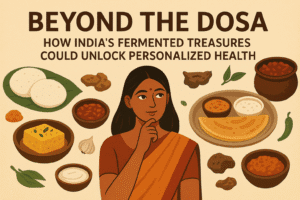Beyond the Dosa: How India’s Fermented Treasures Could Unlock Personalized Health
Groundbreaking Indian research reveals that bioactive peptides (BAPs) in fermented foods like idli, dosa, yogurt, and fermented fish offer significant health benefits – regulating blood pressure, sugar, immunity, and inflammation. Crucially, the study found these benefits aren’t universal; an individual’s unique genetic makeup (like ACE or IL-6 gene variants), gut microbiome composition, and health status dramatically influence how effectively their body responds. This variability presents a powerful opportunity for India.
With its immense genetic diversity and rich tradition of region-specific fermented foods (from dhokla to gundruk), the nation is uniquely positioned to pioneer personalized nutrition. Harnessing this requires validating traditional foods with modern ‘omics’ science and understanding population-specific responses. Success could transform these everyday staples into precise tools for combating lifestyle diseases, making India a global leader in tailoring nutrition to individual biology. The humble fermented food, deeply rooted in culture, might hold the key to future health.

Beyond the Dosa: How India’s Fermented Treasures Could Unlock Personalized Health
For millennia, India’s culinary landscape has been quietly conducting a grand experiment in gut health. From the tangy kick of dhokla in Gujarat to the pungent allure of gundruk in the Northeast, fermented foods aren’t just staples – they’re potent reservoirs of health. Groundbreaking research now suggests these traditional foods hold a key to something revolutionary: personalized nutrition tailored to India’s immense genetic and cultural diversity.
A landmark study led by Prof. Ashis K. Mukherjee and his team at the Institute of Advanced Study in Science and Technology (IASST), Guwahati (under the DST), published in Food Chemistry (2025), delves deep into the science behind grandma’s wisdom. Their focus? Bioactive Peptides (BAPs) – tiny protein fragments formed during fermentation in foods like yogurt, idli, dosa batter, miso, natto, kimchi, and various fermented fish.
The Power in the Pot:
These BAPs aren’t just byproducts; they’re dynamic molecules. The IASST research confirms they actively interact with our body’s systems through electrostatic forces, hydrogen bonding, and hydrophobic interactions, yielding significant benefits:
- Blood Pressure Regulation: Certain peptides act as natural ACE inhibitors.
- Blood Sugar Management: Others show potential in modulating glucose metabolism.
- Immune Boost & Inflammation Control: Peptides exhibit immune-modulatory and anti-inflammatory effects.
- Antioxidant & Antimicrobial Activity: They combat oxidative stress and harmful microbes.
The Diversity Dilemma: One Food, Many Responses
Here’s where the study breaks new ground and speaks directly to India’s reality. The health impact of these beneficial peptides is not universal. The research highlights that an individual’s response depends critically on:
- Genetic Makeup: Variations in genes (like those for ACE or IL-6) influence how effectively your body utilizes specific BAPs. A peptide that lowers blood pressure significantly in one person might have a muted effect in another.
- Gut Microbiome: Your unique gut bacteria population determines how BAPs are processed, broken down, and ultimately, how their benefits are unlocked.
- Diet & Health Status: Overall diet, existing health conditions (like diabetes or gut disorders), and even lifestyle factors modulate BAP activity and absorption.
Why This Matters for India:
This variability isn’t a flaw; it’s an opportunity. India’s population is a tapestry woven from thousands of distinct genetic lineages, regional diets, and cultural practices influencing gut microbiomes. The “one-size-fits-all” approach to nutrition and health interventions often falls short. Fermented foods, deeply embedded in local traditions across India, offer a uniquely adaptable solution:
- Regional Specialization: Foods like kinema in the East, hawaijar in the Northeast, or kanji in the North inherently contain BAP profiles shaped by local microbes and ingredients, potentially aligning better with the local population’s biology over imported “superfoods.”
- Personalized Potential: Understanding how specific traditional ferments interact with different Indian genotypes and microbiomes paves the way for truly personalized dietary advice. Imagine healthcare providers recommending specific regional fermented foods based on an individual’s profile.
The Path Forward: Tradition Meets Cutting-Edge Science
The IASST study advocates for a powerful synergy:
- Validate Tradition: Rigorously document the BAP profiles and health impacts of India’s vast repertoire of traditional fermented foods – from household recipes to rural delicacies.
- Embrace “Omics”: Leverage genomics (studying genes), proteomics (studying proteins), and microbiomics (studying gut microbes) to map how diverse Indians respond to different BAPs. This requires large-scale, population-specific studies.
- Innovate & Standardize: Address challenges like variability in homemade fermentation, ensuring peptide stability, and understanding complex interactions within the gut. Develop accessible, affordable methods for quality control and potentially targeted probiotic formulations.
- Integrate into Public Health: Incorporate validated traditional fermented foods into national nutrition programs and dietary guidelines, celebrating them as functional foods, not just cultural artifacts.
The humble idli or the pungent fermented fish isn’t just food; it’s a complex, living ecosystem teeming with health-modulating molecules. The IASST research illuminates a path where India’s rich heritage of fermentation could become the cornerstone of a global leadership position in precision nutrition. By scientifically unlocking why these foods work differently for different people, we move closer to a future where “eating right” means eating what’s uniquely right for you, guided by the wisdom of tradition and the power of modern science. The key to personalized health might just be fermenting in kitchens across the nation.
You must be logged in to post a comment.